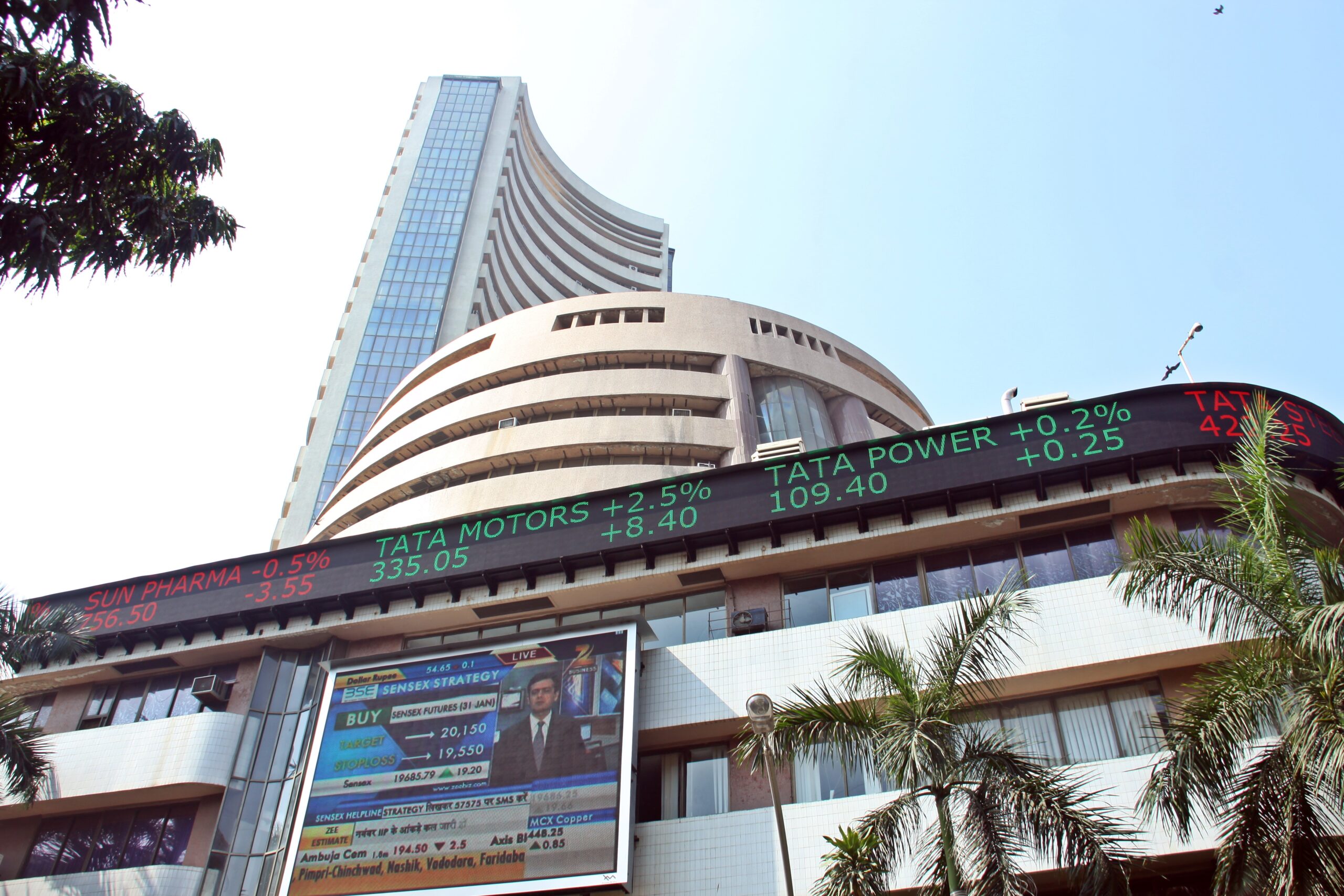In today’s trading session, the Indian stock market witnessed a notable decline, with both the BSE Sensex and NSE Nifty experiencing significant losses. As of the latest updates, the Sensex dropped by more than 200 points, sliding below the crucial psychological level of 60,000. Meanwhile, the Nifty index also saw a downward movement, slipping below the 22,300 mark, indicating a broad-based sell-off across various sectors. The negative momentum in the stock market was driven by a combination of domestic and global factors, raising concerns among investors and traders alike.
Key Indices Struggle Amid Volatile Conditions
The broader market was under pressure throughout the session, with both major indices showing consistent weakness. The BSE Sensex, which tracks the performance of the top 30 companies on the Bombay Stock Exchange, closed lower by over 200 points, or roughly 0.3%, bringing its total loss to around 700 points in the past week alone. The Sensex finished at approximately 59,800, struggling to hold on to the key support levels. On the other hand, the NSE Nifty 50, a benchmark index representing the top 50 companies on the National Stock Exchange, ended the day with a loss of nearly 0.4%, settling just under 22,300.
Sectoral Weakness Drives Market Downturn
Several sectors came under heavy selling pressure during today’s session, contributing to the overall market decline. The banking and financial services sectors, in particular, saw considerable losses. Investors seemed concerned about the potential impact of rising interest rates on the financial sector’s growth and profitability. Additionally, global market sentiment remained cautious, particularly amid concerns about tightening monetary policies in major economies like the United States and the European Union.
The IT sector also felt the heat, with many large-cap stocks showing negative price movements. The rising costs of operation and a potential slowdown in demand for software services weighed on investor sentiment. The pharma and consumer goods sectors, which are typically more defensive, also recorded losses, though not as severe as the ones seen in the banking and IT sectors.
Trent, SBI Life, and Bharti Airtel Top the Losers List
Among the individual stocks, Trent, SBI Life Insurance, and Bharti Airtel emerged as the top losers of the day. Trent, part of the Tata Group, saw its share price fall sharply by more than 5%, after market analysts revised their outlook on the stock. Despite the company’s strong performance in recent quarters, investors appeared concerned about the short-term outlook for the retail sector, especially given rising inflation and fluctuating consumer spending.
SBI Life Insurance also witnessed significant selling pressure, with its shares dropping nearly 4% during the session. The life insurance sector as a whole has been facing headwinds, as investors remain cautious about the potential impact of regulatory changes and broader market volatility. Additionally, the possibility of interest rates rising could adversely affect the bond yields and thus the investment returns from life insurance policies.
Bharti Airtel, one of India’s largest telecom operators, continued to face challenges in the market, with its stock price falling by about 3.5%. The telecom sector has been grappling with increased competition, rising operational costs, and the pressures of maintaining profitability amid the ever-growing demand for data services. While Bharti Airtel has been performing well in terms of subscriber growth and network expansion, concerns about its future earnings and the regulatory environment have put pressure on its stock price.


Global Factors Contributing to Market Weakness
The Indian stock market’s poor performance today is also linked to broader global market trends. The US markets faced a sharp correction, primarily driven by worries about inflationary pressures and the Federal Reserve’s potential response with further interest rate hikes. Global investors have been re-evaluating their positions, leading to a pullback in stock markets around the world. European indices also struggled as inflationary concerns persisted, keeping global sentiment subdued.
Commodity prices also came under pressure, especially crude oil, which saw a decline following concerns over a slowdown in global economic growth. Falling oil prices often signal concerns about global demand, particularly from major economies like China, which has been showing signs of slowing down. As a result, sectors sensitive to energy costs, such as airlines and transportation, have also experienced some volatility in recent weeks.
Domestic Economic Concerns Add to Investor Worries
On the domestic front, investors are closely watching the economic data and its impact on market sentiment. Rising inflation, which has remained stubbornly high in recent months, is another key factor influencing market movements. Inflationary pressures have led to higher food and fuel prices, eroding consumer purchasing power and dampening sentiment in the broader economy. Additionally, corporate earnings for the ongoing quarter have not met market expectations, further dampening investor confidence.
India’s fiscal situation remains a point of concern as well. With the government continuing to focus on economic recovery, there are worries about fiscal deficits and the potential for higher borrowing to fund stimulus measures. These concerns have led to a cautious outlook on Indian equities, particularly in the mid and small-cap segments, which have been more volatile in recent trading sessions.
Market Outlook: Caution and Volatility
Looking ahead, the market is expected to remain volatile in the short term, with investors keeping a close eye on key economic data, including inflation readings and corporate earnings reports. While long-term prospects for the Indian economy remain positive, short-term headwinds such as rising interest rates, global economic uncertainty, and inflationary pressures are likely to keep the markets in a state of cautious optimism.
Analysts suggest that while the current correction in the stock market may present buying opportunities in certain sectors, it’s essential for investors to remain selective. For now, traders and investors will need to navigate the volatility carefully, keeping an eye on global trends and domestic economic indicators that could influence market sentiment in the coming weeks.
In conclusion, today’s market performance highlights the challenges faced by the Indian stock market in the face of global and domestic economic uncertainties. With key stocks like Trent, SBI Life, and Bharti Airtel seeing substantial declines, market participants remain on edge, awaiting clearer signals from both economic data and corporate earnings in the coming weeks. The road ahead may remain rocky, but there are still opportunities for investors with a long-term outlook.
FOLLOW:https://newsroom47.com/elon-musk-calls-out-biden-for-blocking-spacexs/
Newsroom 47
